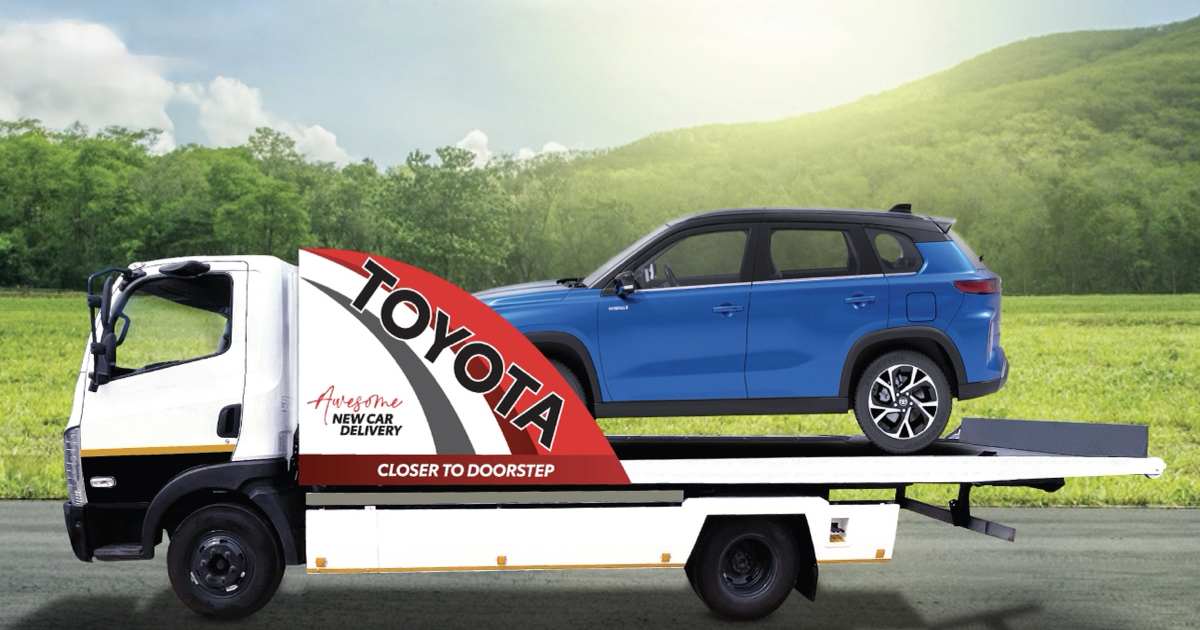Toyota has introduced a service where new vehicles are transported from the dealer's stockyard to the delivery location on a flatbed. This will be of particular benefit in rural and semi-urban locations where last mile logistics pose challenges. Currently in its first phase of rollout, this service will be available across 130 authorised Toyota dealerships in 26 states as part of the sales process.
Evolution of Vehicle Delivery Methods
The process of delivering new vehicles to customers has undergone significant evolution over the years, driven by advancements in technology, logistics, and customer expectations. Historically, vehicles were transported from manufacturing facilities to dealerships via truck trailers or railway networks, with cars stacked or loaded onto conventional transporters. While these methods have served their purpose, they often posed challenges in terms of accessibility, safety, and damage prevention.
The Concept of Flatbed Delivery
Flatbed delivery represents a departure from conventional vehicle transportation methods, to be offering the several advantages in terms of safety, and the convenience, and customer satisfaction. Unlike traditional transporters, which require vehicles to be driven onto or offloaded from ramps, flatbed trucks feature a level surface onto which vehicles can be securely strapped and transported.
Key Benefits of Flatbed Delivery
The adoption of flatbed delivery by Toyota brings several key benefits for both the company and its customers:
- Enhanced Safety: Flatbed delivery eliminates the need for the vehicles to be driven or the maneuvered onto transporters, reducing the risk of some accidents or damage during loading and unloading.
- Protective Transport: By providing a stable and level surface for vehicle transport, flatbed trucks offer superior protection against road debris, potholes, and other hazards encountered during transit.
- Improved Accessibility: Flatbed delivery facilitates easy access to vehicles for inspection, detailing, and pre-delivery preparation at the dealership. With vehicles securely strapped onto the flatbed, dealership staff can perform necessary checks and procedures without the need for specialized equipment or maneuvering.
- Customer Satisfaction: The introduction of flatbed delivery reflects Toyota's commitment to delivering exceptional customer service and satisfaction. By offering the premium delivery experience and that prioritizes safety, the convenience, and vehicle protection, the Toyota aims to be enhance the overall ownership experience for its customers.

Logistical Considerations
Implementing flatbed delivery requires careful planning and coordination to ensure seamless execution and optimal efficiency. Logistics teams must consider factors such as vehicle scheduling, and the route planning, loading/unloading procedures, and for the driver training to be maximize the benefits of flatbed delivery while it can minimizing logistical challenges and operational costs.
Environmental Impact
While flatbed delivery offers several advantages in terms of vehicle protection and customer satisfaction, it's essential to consider its environmental impact. While traditional transporters may be more fuel-efficient due to their larger carrying capacity, flatbed trucks may consume more fuel per vehicle transported. However, advancements in engine technology, the aerodynamics, and for the route optimization which can help mitigate environmental concerns associated with flatbed delivery.
Conclusion
As a part of the program, dealerships will be tying up with logistics companies where single carrier flatbed trucks will be used. Furthermore, customers need not pay any additional cost for this transport, and the dealer will also provide insurance for the same.
Last month, Toyota had temporarily paused despatches of the Innova Crysta, Fortuner and Hilux due to irregularities in the diesel engine's horsepower certification testing, however, they resumed dispatches of the said models last week.

